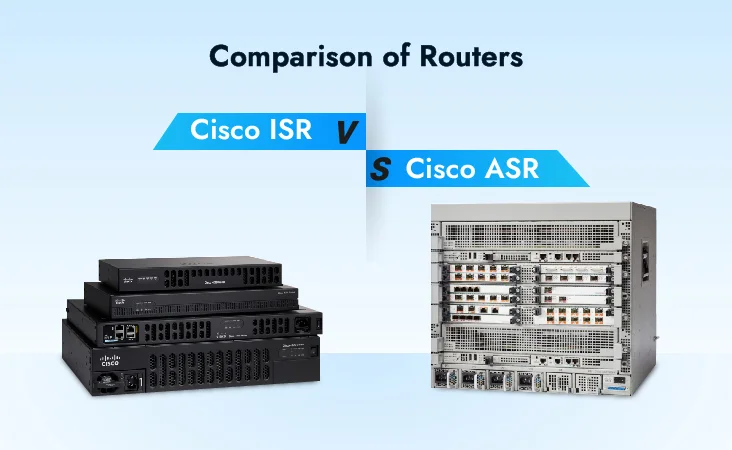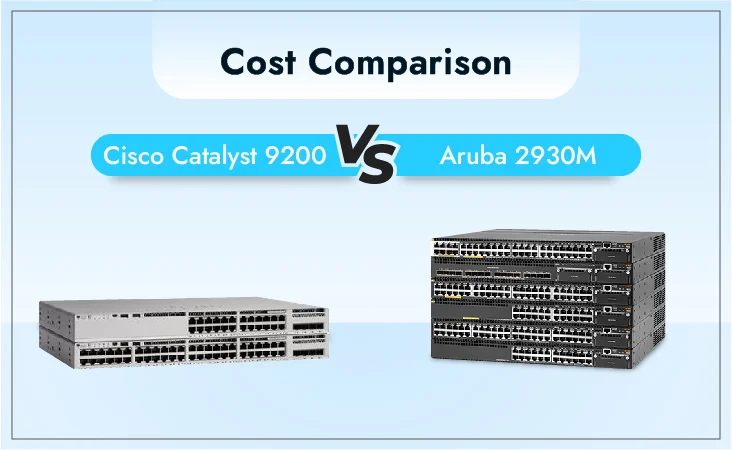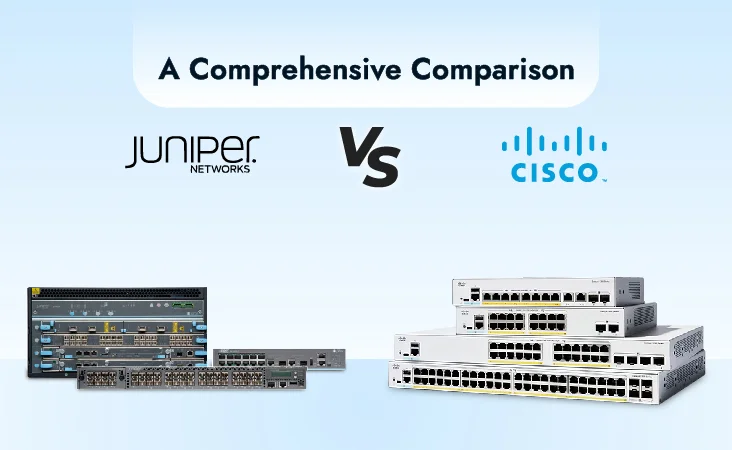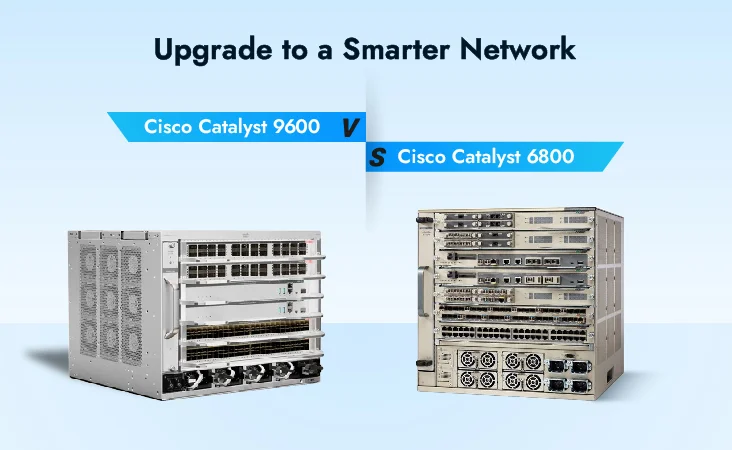PRODUCTS
 18
18Cisco is a well-known player in the computer network industry. It ensures connectivity without interruption and the seamless flow of data within a network. Cisco offers numerous routers appropriate for diverse computing settings, including small and large businesses.
Cisco ISR and ASR are two of their best-selling routers. We will compare Cisco's ASR and ISR router series to assist you in making the right decision when purchasing a router.
Cisco ISR stands for Integrated Services Router. It is a multifunctional networking device that is designed to provide a wide range of services. Cisco ISR offers modular architecture and integrated services. Its routers provide reliable, secure branch connectivity and a robust set of features that enable cloud computing, secure networking, multimedia performance, and mobile connectivity. However, the Cisco ISR routers also have lower maximum Ethernet speeds; the higher-end router in the ISR 4000 series supports only 10G Ethernet.
Cisco ISRs are typically used in bandwidth-constrained environments. This router model is available from Cisco in several configurations, including the ISR 800 series, the ISR 1900 series, the ISR 2900 series, the ISR 3900 series, and the ISR 4000 series. These models use IOS as their operating system.
On the other hand, Cisco ASR series routers are engineered for high performance, delivering exceptional speed and scalability. ASR stands for Aggregation Services Routers and is used primarily for edge routing. They are ideal for high-bandwidth applications, such as streaming audio or videos and video conferencing. When you buy Cisco ASR routers, you select the most reliable router with advanced capabilities.
While all Cisco ASR series routers can handle up to 100G Ethernet, the Cisco ASR 900 Series and ASR 1000 Series are limited to edge routing.
Both Cisco ISR and ASR are well-known for their reliability, outstanding performance, and superior capabilities. They both share a common goal of providing detailed networking solutions, including routing, security, and data integration services. In terms of similarities, both Cisco ASR and ISR routers offer secure WAN connectivity. They have also both been approved to secure sensitive data when configured with the PSN Interim IPsec Profile. Additionally, both routers come from the trusted Cisco family, ensuring a high standard of quality, regular updates, and ongoing support.
Table 1. Below are the similarities between the Cisco ISR and ASR series routers.
|
Feature |
Cisco ISR |
Cisco ASR |
|
Routing |
Both support a wide range of routing protocols, including OSPF, EIGRP, BGP, and more. |
Similar support for various routing protocols, ensuring compatibility with diverse network environments. |
|
Services |
Integrated services such as security (firewall, VPN), voice, and application optimization. |
Offers integrated services like security, voice, and application optimization, making it versatile for different deployment scenarios. |
|
Modularity |
Modular design with the ability to add interface modules for various connectivity options. |
Modular architecture, allowing for the addition of interface modules and expansion cards to accommodate different interface types. |
|
Scalability |
Scalable to meet the needs of small to medium-sized businesses as well as large enterprises. |
Designed for scalability, suitable for deployment in enterprise and service provider networks with varying scale requirements. |
|
Performance |
Provides varying levels of performance based on the specific model, suitable for different network sizes. |
Higher performance capabilities compared to ISR, catering to larger and more demanding network environments. |
|
Redundancy |
Supports redundancy features such as Hot Standby Router Protocol (HSRP) and Virtual Router Redundancy Protocol (VRRP). |
Offers redundancy features to ensure high availability, critical for mission-critical applications and services. |
|
Unified OS |
Runs Cisco IOS (Internetwork Operating System), providing a consistent and familiar operating environment. |
Utilizes a unified operating system, typically Cisco IOS XE, ensuring consistency and ease of management. |
|
Manageability |
Common management tools and interfaces, including Cisco Configuration Professional (CCP) and Cisco Prime. |
Similar management tools and interfaces, allowing administrators to efficiently configure and monitor the routers. |
|
Security Features |
Both platforms include a range of security features, including access control lists (ACLs), intrusion prevention, and VPN support. |
Built-in security features such as threat detection, encryption, and secure connectivity options for safeguarding network traffic. |
Although there are many similarities between Cisco Integrated Service Routers and Cisco Aggregation Service Routers, there are also several key differences that are ultimately more important when you compare Cisco ISR vs ASR routers. The primary difference is in their intended applications and performance capacities. Cisco ISR, with its modular architecture, is designed for flexibility and versatility, making it an excellent choice for a wide range of network sizes and types. It excels in handling standard workloads efficiently.
Conversely, Cisco ASR is engineered for high performance and scalability, making it the preferred option for businesses dealing with heavy data tasks and demanding networking needs. The customizable configurations and superior efficiency of Cisco ASR, at a slightly higher initial cost, can lead to lower long-term operational expenses.
Table 2. enlists some differences between the Cisco ISR and ASR routers.
|
Differences |
Cisco ISR |
Cisco ASR |
|
Purpose |
Designed for small to medium-sized enterprises. |
Primarily designed for large-scale enterprises and service providers. |
|
Performance |
Typically lower performance compared to ASR. |
High-performance capabilities for demanding network environments. |
|
Scalability |
Limited scalability for larger networks. |
Highly scalable to support large and complex networks. |
|
Modularity |
Offers modular options, but with fewer slots. |
Provides a high level of modularity with a greater number of slots and options. |
|
Service Modules |
Supports a range of service modules. |
Offers a broader range of service modules, including specialized ones for carrier-grade services. |
|
Redundancy |
Redundancy options available but may be limited. |
Enhanced redundancy features for high availability in critical environments. |
|
Virtualization |
Supports limited virtualization capabilities. |
Advanced virtualization features for running multiple applications and services. |
|
Interface Options |
There are varied interface options for standard needs. |
Extensive interface options, including high-speed Ethernet and optical interfaces. |
|
Deployment |
Commonly used in branch offices and smaller networks. |
Ideal for core network infrastructure in large enterprises and service provider environments. |
|
Cost |
Generally more cost-effective for smaller deployments. |
Higher initial cost but offers value for complex and demanding network environments. |
Use Cases |
Branch office networking, small to medium-sized networks. |
Core networking, data centers, and service provider networks. |
|
Integrated Services |
Emphasis on integrated services for branch deployments. |
Designed to deliver a wide range of integrated services at scale. |
There are noticeable variations in the performance of the Cisco ISR (Integrated Services Router) and ASR (Aggregation Services Router) that address different networking requirements. Known for its adaptability, Cisco ISR offers remarkable speed appropriate for typical workloads. It manages data integration, security, and routing tasks with efficiency. Conversely, Cisco ASR excels in handling heavy workloads and data-intensive tasks with remarkable efficiency. With its high performance capabilities, it is the best choice for people who desire network efficiency.
Table 3. Summarizes the difference in the performance of both Cisco ISR vs ASR routers.
|
Feature |
Cisco ISR Series |
Cisco ASR Series |
|
Routing Performance |
Generally suitable for branch offices |
Designed for high-performance core, aggregation, and edge routing |
|
Throughput |
Moderate to High |
High to Very High |
|
Scalability |
Limited scalability for large networks |
Highly scalable for large networks |
|
Modularity |
Modular with various module options |
Highly modular, with multiple slots for expansion cards |
|
Redundancy and Reliability |
Offers good redundancy options |
Emphasizes high availability with features like Cisco IOS XE Software, redundant power supplies, and hot-swappable components |
|
Interface Types |
Supports a variety of interfaces, including Ethernet, T1/E1, DSL, and more |
Supports a wide range of interfaces, including high-speed Ethernet, SONET/SDH, and more |
|
QoS (Quality of Service) |
Offers QoS features for basic traffic prioritization |
Provides advanced QoS capabilities for sophisticated traffic management and prioritization |
|
Security Features |
Includes basic security features such as firewall and VPN support |
Offers advanced security features with integrated threat defense, VPN, and high-performance encryption |
|
Management |
Managed using Cisco IOS Software |
Managed using Cisco IOS XE Software with advanced management capabilities |
Table 4. Shows some scalability comparison between Cisco routers.
|
Criteria |
Cisco ISR |
Cisco ASR |
|
Adapting to Growing Needs |
Offers flexibility |
Highly scalable to meet growing demands |
|
Configurational Flexibility |
Flexible configurations |
Customizable configurations |
High security is a top priority in today's interconnected world. The cost-effective Cisco ISR offers strong security features appropriate for most business needs. However, the Cisco ASR takes security to the next level with its advanced measures, making it the preferred choice for industries with strict security regulations.
Table 5. Compares the security features between Cisco ISR and ASR series routers.
|
Security Feature |
Cisco ISR |
Cisco ASR |
|
Firewall |
Integrated Cisco IOS Firewall |
Integrated Cisco IOS Firewall |
|
Intrusion Prevention |
Cisco Intrusion Prevention System (IPS) |
Cisco IPS with Cisco ASR 1000 Series |
|
VPN Support |
IPsec VPN, SSL VPN, DMVPN |
IPsec VPN, SSL VPN, DMVPN |
|
SSL Inspection |
Supported |
Supported |
|
Secure Sockets Layer (SSL) VPN |
Supported |
Supported |
|
Identity Services Engine (ISE) Integration |
Supported |
Supported |
|
MACsec Encryption |
Supported |
Supported |
|
Role-Based Access Control (RBAC) |
Supported |
Supported |
|
TrustSec Security Group Tags (SGT) |
Supported |
Supported |
|
Network Address Translation (NAT) |
Supported |
Supported |
|
Content Filtering |
Cisco Cloud Web Security (CWS), Web Filtering |
Cisco Cloud Web Security (CWS), Web Filtering |
|
Secure Boot and Image Signing |
Supported |
Supported |
|
Hardware Security Modules (HSM) |
Supported |
Supported |
|
Control Plane Policing (CoPP) |
Supported |
Supported |
|
Cisco Umbrella Integration |
Supported |
Supported |
|
Secure Unified Communications |
Supported |
Supported |
|
Integrated Threat Defense |
Cisco Firepower Threat Defense (FTD) |
Cisco Firepower Threat Defense (FTD) |
|
High Availability |
HSRP, VRRP, GLBP, and Cisco Hot Standby Router Protocol (HSRP) |
HSRP, VRRP, GLBP, and Cisco Hot Standby Router Protocol (HSRP) |
|
Unified Threat Management (UTM) |
Supported |
Supported |
|
Network Foundation Protection (NFP) |
Supported |
Supported |
When it comes to costs, Cisco ISR is a cost-effective choice for users on a tight budget. However, it's crucial to consider the long-term costs, which include maintenance and upgrades. The Cisco ASR is costly, in contrast to the Cisco ISR, because of their long run for larger enterprises with intensive networking needs.
When considering to buy a new or refurbished Cisco ISR or ASR router, some factors come into play. New routers come with the advantage of being fully covered by the manufacturer's warranty and offering the newest technological advancements, despite typically costing more. However, on the other hand, selecting a refurbished Cisco router can provide cost savings, although it comes with compromises in terms of a limited warranty and potential variations in performance based on the quality of the refurbishment.
While brand new routers ensure excellent performance and ongoing support, refurbished options can be a viable solution for those looking for a balance between affordable and satisfactory performance.
Table 6. Compares the new vs refurbished Cisco ISR and ASR series routers.
|
Feature |
New Cisco ISR Router |
Refurbished Cisco ISR Router |
New Cisco ASR Router |
Refurbished Cisco ASR Router |
|
Price |
Higher |
Lower |
Higher |
Lower |
|
Warranty |
Full manufacturer's warranty |
Limited warranty, typically shorter |
Full manufacturer's warranty |
Limited warranty, typically shorter |
|
Condition |
Brand new |
Professionally restored to like-new |
Brand new |
Professionally restored to like-new |
|
Performance |
Optimal |
Optimal |
Optimal |
Optimal |
|
Reliability |
High |
Dependent on refurbishment quality |
High |
Dependent on refurbishment quality |
|
Support |
Full manufacturer support |
Limited support from refurbisher |
Full manufacturer support |
Limited support from refurbisher |
|
Availability |
Widely available |
Limited availability of specific models |
Widely available |
Limited availability of specific models |
|
Up-to-date Technology |
Latest features and technologies |
May lack the latest features |
Latest features and technologies |
May lack the latest features |
Consulting with IT Professionals: Stressing the value of consulting IT professionals before making a choice.
Evaluating Present and Future Requirements: Advice on assessing present and future network requirements to make sure the router selected is in line with long-term objectives.
Thinking About Technological Advancements: Stressing the Need to Think About Upcoming Technological Developments and Trends in Networking.
Sharing success stories of businesses that have benefited from using Cisco ISR in their network infrastructure.
Highlighting the positive outcomes and improved performance observed by businesses utilizing Cisco ASR.
Want to buy this series of products? please contact:
ORM Systems is a global IT hardware and Software Solution provider. Our core focus is providing authentic, reliable, and cost-effective IT hardware products along with enterprise software solutions. Our superior customer service team has built a strong correlation between our customers and suppliers. We have laid out our physical presence by having operational branches and warehouses in the UK, USA, Europe and the Middle East. We stock huge inventory globally and provide fast delivery to an absolute supply chain and logistics for our consumers all around the world, with a guarantee of meeting your standard requirements.
In conclusion, choosing between Cisco ISR and ASR involves weighing various factors. By considering performance, scalability, and cost, businesses can make informed decisions that align with their specific needs. If your business is small to medium-sized, the ISR router series is the better choice. For large enterprise networks with edge routing or high bandwidth capabilities, the ASR series is the right selection.
More Topics:
Difference between Cisco 9300 Series and 9200 Series Switches
Why Migrate from Cisco Catalyst 3850 to 9300 series switches?
Cisco Nexus Vs Catalyst Switches: what’s the difference?
Q: Can I use Cisco ISR for a small business network?
A: Yes, Cisco ISR is suitable for small businesses, offering versatility and reliable performance.
Q: Is purchasing a refurbished Cisco router a safe option?
A: Yes, as long as you buy from reputable sources, refurbished Cisco routers can be a cost-effective and reliable choice.
Q: What factors should I prioritize when choosing between ISR and ASR?
A: Consider your network's size, performance needs, and budget constraints to make an informed decision.
Q: Are there any known issues with Cisco ISR handling heavy workloads?
A: Cisco ISR performs well under standard workloads, but for heavy data tasks, ASR might be a more suitable option.
Q: How frequently should I assess my network needs for a potential router upgrade?
A: It's advisable to assess your network needs annually and whenever there is a significant change in your business structure or operations.
Recent Posts

Cisco Catalyst 9200 Switches vs Aruba 2930M Switches: Comparing Prices
30 April-2024

What Makes the Cisco Catalyst C9200-24P-A Switch Ideal for Medium-Sized Businesses?
30 April-2024

Cisco vs Juniper: A Comprehensive Comparison
26 April-2024

Cisco vs Juniper: A Comprehensive Network Comparison
26 April-2024

Cisco Catalyst 9600 vs Cisco Catalyst 6800 Series Switches: Upgrade to a Smarter Network
25 April-2024
Most Used Tags

Developing performance-driven networks to boost the efficiency of your business

Thank you for your interest in ORM systems, our experts will connect with you shortly.
 +1 (281)
747-5957
+1 (281)
747-5957


